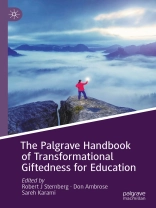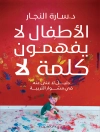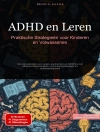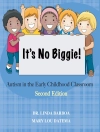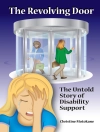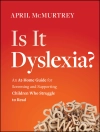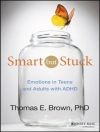This handbook examines what education would look like if it prepared gifted students to transform the world—to make it a better place for all, not just for those who receive extra resources from schools in return for being labeled as “gifted.” The editors explore how transformationally gifted people can seek to make the world a better and more just place: they try to make a positive, meaningful, and possibly enduring contribution to changing things in the world that are not working. They do not view “giftedness” merely as a transaction whereby, in exchange for being labeled as “gifted, ” they accrue benefits to themselves: such as a more prestigious education, more income, or residence in a more exclusive community. The overarching aim of this book is to present conceptions of what identification and instruction of the gifted would look like if the focus of gifted education was transformational rather than transactional. What if gifted education did not focus so much on acceleration vs.enrichment, or pull-out versus in-class integration, but rather on how to be gifted in giving back—in using one’s gifts to create a better world?
Tabela de Conteúdo
Chapter 1: Discovering and Dismantling Enormous Barriers Hindering the Transition from Transactional to Transformational Giftedness; Don Ambrose – Rider University.- Chapter 2: The Beautiful Risk of Moving Toward Pedagogies of the Possible.; Ronald A. Beghetto and Vlad P. Glăveanu – Arizona State University and the University of Bergen.- Chapter 3: Respecting the Invisible: Transactional and Transformational Approaches to Giftedness; Dowon Choi and James C. Kaufman – Florida State University and Arizona University.-Chapter 4: From I to We: The Three C’s Conception of Gifted Education; Aakash A. Chowkase and Sujala Watve – Purdue University and Jnana Prabodhini’s Institute of Psychology.- Chapter 5 :A Catalyst for Change: Improving the World through Talent Development; Jennifer Riedl Cross and Tracy L. Cross – College of William & Mary.- Chapter 6: Ten Changes that Will Render Gifted Education Transformational; David Yun Dai – University at Albany, State University of New York.- Chapter 7: Promoting Transformational Giftedness Through Service Learning; Ophélie Allyssa Desmet – Valdosta State University.- Chapter 8: Fairminded Critical Thinking and Depth of Knowledge as Essential to Gifted Education Programs that Advance the Common Good; Linda Elder – Foundation for Critical Thinking.-Chapter 9: Be Prepared for the Complexities of the 21st Century!; Joachim Funke – Heidelberg University.- Chapter 10: Addressing Access, Equity, and Missingness to Transform Gifted Education; Marcia Gentry – Purdue University.- Chapter 11: Through the Dąbrowski Lens: Wisdom, Transformational Giftedness, and the Personality Ideal; Amanda J. Harper – University of Tasmania.- Chapter 12: Evidence of Transformational Giftedness in the Profoundly Gifted When We Use the ‘Integral Practice the Gifted™’ Model; P. Susan Jackson – Daimon Institute for the Highly Gifted Inc.- Chapter 13: Starting Over: An Iranian Conception of Giftedness and How It Can Transform Societies and the World.; Sareh Karami and Mehdi Ghahremani – Mississippi State University.- Chapter 14: Transformational Education as a Work in Process: Insights from Transformationally Gifted Adults; Lori Lutz – The Roeper Institute.- Chapter 15: The Rainbow Revolution: Empowering Gifted LGBTQ+ Learners for Transformative Action; Andres Parra-Martinez and Alena R. Treat – Purdue University and Upper Iowa University.- Chapter 16: Transformational Giftedness: Using SEM Pedagogy to Create Future Leaders and Change Agents Dedicated to Service, Social Responsibility, and Using Their Talents to Improve the Planet; Sally M. Reis and Joseph S. Renzulli – University of Connecticut.- Chapter 17: Equity, Social Justice and Transformational Giftedness – A Gifted Academy in a Vulnerable Community; Renu Singh and Bharath Sriraman – Maryvale Gifted & Talented Academy and University of Montana – Missoula.- Chapter 18: Transfrmational Giftedness: Who’s Got It and Who Does Not; Robert J. Sternberg – Cornell University.- Chapter 19: Channeling Gifted Abilities into Transformative Creative Productivity; Rena F. Subotnik, Paula Olszewski-Kubilius, and Frank C. Worrell – American Psychological Association, Northwestern University, University of California, Berkeley.- Chapter 20: Educating Ethical Minds in Gifted Education; Kirsi Tirri – University of Helsinki.-Chapter 21: Redefining Human Talents: Gifted Education in the Age of Smart Machines; Yong Zhao, James Basham, and Jason Travers – Melbourne Graduate School of Education, University of Kansas, Temple University.- Chapter 22: In Conclusion: Where We Currently Stand in the March Toward Transformational Giftedness.
Sobre o autor
Robert J. Sternberg is Professor of Psychology in the College of Human Ecology at Cornell University, USA, and Honorary Professor of Psychology at the University of Heidelberg, Germany. He was cited in an APA Monitor on Psychology report as one of the top 100 psychologists of the 20th century and in a report in Archives of Scientific Psychology by Diener and colleagues as one of the top 200 psychologists of the modern era.
Don Ambrose is Professor of Graduate Education at Rider University USA, and editor of the Roeper Review, an international research journal serving the field of gifted education. In his interdisciplinary work he explores the conceptual terrain of more than 30 academic disciplines and professional fields to mine constructs relevant to creative intelligence.
Sareh Karami is Assistant Professor of Educational Psychology at Mississippi State University, USA. She worked for more than ten years in the Iranian Gifted School as the head of the Research Department.
